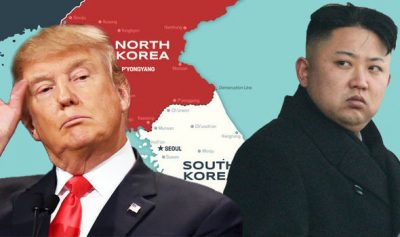South Korea Should “Brexit” the United States

With President Trump being accompanied by three U.S. carrier groups during his trip to Korea, South Koreans should pull a “Brexit” on the United States. As I counseled last April and August in two separate articles, South Korea should dissolve their alliance with the United States and kick all U.S. troops out of the country. (See “South Korea Should Give U.S. Troops the Boot” and “South Korea Should Give U.S. Troops the Boot, Part 2.) The time to do so is now, before it is too late.
The top priority of U.S. officials is to prevent North Korea from acquiring the ability to hit the United States with a nuclear bomb. Everything else, including the lives of South Koreans and even the lives of U.S. civilians in South Korea and the lives of U.S. soldiers stationed in South Korea, is of secondary importance. If hundreds of thousands of those people must be sacrificed to protect the United States from the threat of nuclear attack, there is a growing possibility that Trump and the generals surrounding him will seek war, either by provoking it or initiating it.
Throughout the controversy, most U.S. commentators have assumed the U.S. military presence in Korea as a permanent given. They are unable to think outside the old Cold War box. Their proposed solution to the crisis has been for U.S. officials to sit down with North Korea and try to work out a deal.
That might work, but then again it might not, especially since North Korea knows that the U.S. government cannot be trusted to keep its word in any deal that is reached.
The reason North Korea wants a nuclear capability is not to start a war with the United States or with South Korea. The reason it wants a nuclear capability is to defend itself from one of the U.S. government’s storied regime-change operation or to deter such an operation. If the U.S. government were no longer in South Korea, then the threat of a U.S. regime-change operation would plummet. Most likely, so would the desire of North Korea to acquire a nuclear capability to strike the United States.
But even if North Korea were to proceed with its nuclear program, the chance that it would initiate a war with the United States is nil. Like many totalitarian regimes, North Korea just wants to be left alone. The problem is that the U.S. government won’t leave it alone. It wants regime change, just as it did throughout the Cold War.
When I wrote those two articles last spring and summer, I really didn’t think there was much of a chance that South Koreans would consider a “Brexit” from the United States.
And then I read an article in this week’s New York Times that shows that the idea is being considered … by at least one South Korean. The title of the article is “Is South Korea’s Alliance with the United States Worth It?” The author is a man named Se-Woong Koo, who is the editor in chief of Korea Expose, a major news magazine in South Korea. Here is what Koo says in part:
Consider Mr. Trump’s repeated threats to incite war here, and the majority of the American public’s indifference to Korean lives — a poll from September found 58 percent of Americans support military action against Pyongyang if peaceful means cannot put a stop to its weapons program, even as a congressional report recently concluded that a military conflict on the Korean Peninsula could leave up to 300,000 people dead in the early days of fighting.
In the age of Trump, South Korea should look to an example set by another longtime American ally. Chancellor Angela Merkel of Germany didn’t hesitate to say in May that Europe can no longer “completely depend” on the United States. “We Europeans have to take our destiny into our own hands,” she said.
After being a dutiful ally for more than six decades, it may be time for South Koreans, too, to take their destiny into their own hands.
The South Korean people would be wise to follow Koo’s counsel. Suddenly and immediately dissolving the old Cold War-era South Korea-U.S. alliance and ordering all U.S. troops to immediately withdraw from South Korea would undoubtedly shock the world, just as Brexit did. But so what? Why should South Koreans care about what the United States and rest of the world think when a South Korean “Brexit” ‘from the United States would be the best way — perhaps the only way — to save South Koreans from a devastating war brought on by the U.S. presence in their country, a war they will undoubtedly will end up winning but at a very high cost in terms of loss of life and destruction of property?
Jacob G. Hornberger is founder and president of The Future of Freedom Foundation. He was born and raised in Laredo, Texas, and received his B.A. in economics from Virginia Military Institute and his law degree from the University of Texas. He was a trial attorney for twelve years in Texas. He also was an adjunct professor at the University of Dallas, where he taught law and economics.

